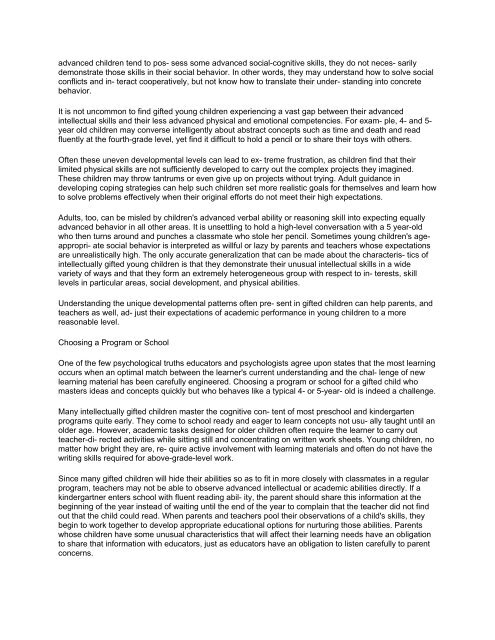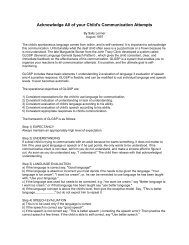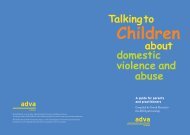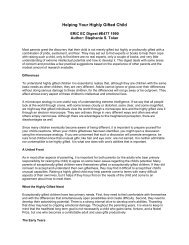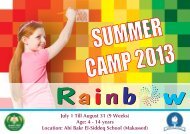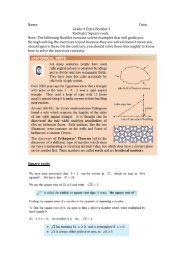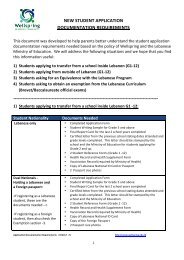Nurturing Giftedness in Young Children - Wellspring Learning ...
Nurturing Giftedness in Young Children - Wellspring Learning ...
Nurturing Giftedness in Young Children - Wellspring Learning ...
You also want an ePaper? Increase the reach of your titles
YUMPU automatically turns print PDFs into web optimized ePapers that Google loves.
advanced children tend to pos- sess some advanced social-cognitive skills, they do not neces- sarily<br />
demonstrate those skills <strong>in</strong> their social behavior. In other words, they may understand how to solve social<br />
conflicts and <strong>in</strong>- teract cooperatively, but not know how to translate their under- stand<strong>in</strong>g <strong>in</strong>to concrete<br />
behavior.<br />
It is not uncommon to f<strong>in</strong>d gifted young children experienc<strong>in</strong>g a vast gap between their advanced<br />
<strong>in</strong>tellectual skills and their less advanced physical and emotional competencies. For exam- ple, 4- and 5year<br />
old children may converse <strong>in</strong>telligently about abstract concepts such as time and death and read<br />
fluently at the fourth-grade level, yet f<strong>in</strong>d it difficult to hold a pencil or to share their toys with others.<br />
Often these uneven developmental levels can lead to ex- treme frustration, as children f<strong>in</strong>d that their<br />
limited physical skills are not sufficiently developed to carry out the complex projects they imag<strong>in</strong>ed.<br />
These children may throw tantrums or even give up on projects without try<strong>in</strong>g. Adult guidance <strong>in</strong><br />
develop<strong>in</strong>g cop<strong>in</strong>g strategies can help such children set more realistic goals for themselves and learn how<br />
to solve problems effectively when their orig<strong>in</strong>al efforts do not meet their high expectations.<br />
Adults, too, can be misled by children's advanced verbal ability or reason<strong>in</strong>g skill <strong>in</strong>to expect<strong>in</strong>g equally<br />
advanced behavior <strong>in</strong> all other areas. It is unsettl<strong>in</strong>g to hold a high-level conversation with a 5 year-old<br />
who then turns around and punches a classmate who stole her pencil. Sometimes young children's ageappropri-<br />
ate social behavior is <strong>in</strong>terpreted as willful or lazy by parents and teachers whose expectations<br />
are unrealistically high. The only accurate generalization that can be made about the characteris- tics of<br />
<strong>in</strong>tellectually gifted young children is that they demonstrate their unusual <strong>in</strong>tellectual skills <strong>in</strong> a wide<br />
variety of ways and that they form an extremely heterogeneous group with respect to <strong>in</strong>- terests, skill<br />
levels <strong>in</strong> particular areas, social development, and physical abilities.<br />
Understand<strong>in</strong>g the unique developmental patterns often pre- sent <strong>in</strong> gifted children can help parents, and<br />
teachers as well, ad- just their expectations of academic performance <strong>in</strong> young children to a more<br />
reasonable level.<br />
Choos<strong>in</strong>g a Program or School<br />
One of the few psychological truths educators and psychologists agree upon states that the most learn<strong>in</strong>g<br />
occurs when an optimal match between the learner's current understand<strong>in</strong>g and the chal- lenge of new<br />
learn<strong>in</strong>g material has been carefully eng<strong>in</strong>eered. Choos<strong>in</strong>g a program or school for a gifted child who<br />
masters ideas and concepts quickly but who behaves like a typical 4- or 5-year- old is <strong>in</strong>deed a challenge.<br />
Many <strong>in</strong>tellectually gifted children master the cognitive con- tent of most preschool and k<strong>in</strong>dergarten<br />
programs quite early. They come to school ready and eager to learn concepts not usu- ally taught until an<br />
older age. However, academic tasks designed for older children often require the learner to carry out<br />
teacher-di- rected activities while sitt<strong>in</strong>g still and concentrat<strong>in</strong>g on written work sheets. <strong>Young</strong> children, no<br />
matter how bright they are, re- quire active <strong>in</strong>volvement with learn<strong>in</strong>g materials and often do not have the<br />
writ<strong>in</strong>g skills required for above-grade-level work.<br />
S<strong>in</strong>ce many gifted children will hide their abilities so as to fit <strong>in</strong> more closely with classmates <strong>in</strong> a regular<br />
program, teachers may not be able to observe advanced <strong>in</strong>tellectual or academic abilities directly. If a<br />
k<strong>in</strong>dergartner enters school with fluent read<strong>in</strong>g abil- ity, the parent should share this <strong>in</strong>formation at the<br />
beg<strong>in</strong>n<strong>in</strong>g of the year <strong>in</strong>stead of wait<strong>in</strong>g until the end of the year to compla<strong>in</strong> that the teacher did not f<strong>in</strong>d<br />
out that the child could read. When parents and teachers pool their observations of a child's skills, they<br />
beg<strong>in</strong> to work together to develop appropriate educational options for nurtur<strong>in</strong>g those abilities. Parents<br />
whose children have some unusual characteristics that will affect their learn<strong>in</strong>g needs have an obligation<br />
to share that <strong>in</strong>formation with educators, just as educators have an obligation to listen carefully to parent<br />
concerns.


